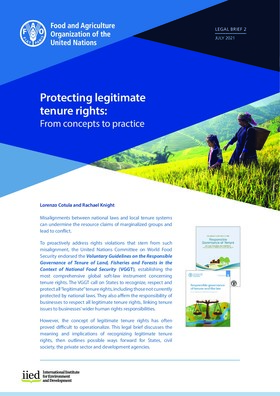Protecting legitimate tenure rights: From concepts to practice
Protecting legitimate tenure rights: From concepts to practice
Misalignments between national laws and local tenure systems can undermine the resource claims of marginalized groups and lead to conflict. To proactively address rights violations that stem from such misalignment, the United Nations Committee on World Food Security endorsed the Voluntary Guidelines on the Responsible Governance of Tenure of Land, Fisheries and Forests in the Context of National Food Security (VGGT), establishing the most comprehensive global soft-law instrument concerning tenure rights. The VGGT call on States to recognize, respect and protect all “legitimate” tenure rights, including those not currently protected by national laws. They also affirm the responsibility of businesses to respect all legitimate tenure rights, linking tenure issues to businesses’ wider human rights responsibilities. However, the concept of legitimate tenure rights has often proved difficult to operationalize. This legal brief discusses the meaning and implications of recognizing legitimate tenure rights, then outlines possible ways forward for States, civil society, the private sector and development agencies.

